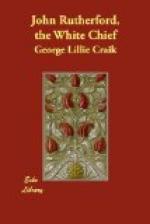Although Pomaree, it would appear, made a merchandise of these heads when he had the opportunity, his countrymen, in general, are far from treating them with so much disrespect. It was with great reluctance that some of them were prevailed upon to sell one to Mr. Banks, when he was with Cook in Queen Charlotte Sound, in 1770; and nothing could induce them to part with a second. They are, in fact, preserved as spoils or trophies during the continuance of the war; and their restoration to the party from whom they have been taken is so indispensable a preliminary to the conclusion of a peace, that it is said no chief would dispose of them, unless it were his determination never to come to terms with his opponents; so that we may suppose this was what Pomaree had resolved upon.
The brain is eaten, like the rest of the body; and the eyes are also frequently devoured by the conqueror, especially the left eye, which, it is believed, ascends to heaven and becomes a star. Shungie is stated, upon one occasion, to have eaten the left eye of a great chief whom he had killed in battle, under the idea of thus increasing the glory and brightness of his own left eye, when it should be transferred to the firmament; for it is understood that when any one eats of the person he has killed, the dead man becomes a part of himself.
[Illustration: Christchurch Museum.
Stone implements used by Maoris for cutting hair.]
Nicholas tells another amusing story of Pomaree’s style of doing “business,” which we shall also give in his own words. “This wily chief,” says he, “had cast a longing eye upon a chisel belonging to one of the missionaries, and to obtain it he had brought some fish on board, which he presented to the owner of the chisel with so much apparent generosity and friendliness, that the other could not help considering it a gratuitous favour, and, receiving it as such, told him he felt very grateful for his kindness.
“But Pomaree had no idea of any such disinterested liberality, and as soon as the fish were eaten, he immediately demanded the chisel in return; which, however, was not granted, as it was a present much too valuable to be given away for so trifling a consideration. Incensed at the denial, the chief flew into a violent rage, and testified, by loud reproaches, how grievously he was provoked by the ill-success of his project. He told the person, who very properly refused to comply with his demand, that ‘he was no good,’ and that he would never again bring him anything more. He attempted the same crafty experiment upon another of our party also, but this proved equally abortive, the person being well aware of his character, and knowing he would require from him ten times more than the worth of his pretended favour.”
Though so covetous and crafty himself, however, Pomaree had no mercy to show for the delinquencies of others. On one occasion, when a poor “cookee” had been detected in the commission of some petty theft about the vessel, he was loud in his exhortations to the captain to hang him up immediately. The man appears, indeed, to have been altogether divested even of those natural affections which scarcely any of his savage countrymen but himself were found to be without.




